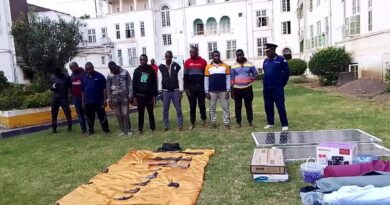Binga legislator demands share of wildlife cake for locals
Binga South lawmaker Fanuel Cumanzala has called for an overhaul of the country’s wildlife governance systems to put communities such as the ones in his constituency at the centre of conservation.
Cumanzala highlighted the glaring disconnect between Zimbabwe’s celebrated wildlife heritage and the lived realities of Binga communities, who coexist with dangerous animals.
“We cannot talk about conservation while ignoring the very people, who have protected these resources for generations,” he said.
Cumanzala traced the roots of today’s inequities to the colonial era when indigenous systems of stewardship were dismantled and replaced with profit driven, exclusionary models.
Despite independence and subsequent reforms, he noted, the power to control and benefit from wildlife remains firmly in the hands of the state and private actors.
“The promises made in 1980 were not just about land; they were about dignity, ownership, and participation,” Cumanzala said.
“Yet for communities in places like Binga, the wildlife is a curse, not a blessing.”
Cumanzala said Binga rural communities face the daily burden of living with wildlife without seeing any tangible benefits.
Crop destruction, restricted land use, and exclusion from key decisions have created deep resentment.
Meanwhile, national parks and private conservancies continue to thrive often at the community’s expense.
“There is legal confusion and a lack of coordination among governing laws as key barriers,” he said.
“The Communal Lands Act says one thing, the Traditional Leaders Act says another, and the Rural District Councils Act says something else.
“This fragmented system denies people a clear voice and paves the way for abuse.”
Cumanzala also criticised the Campfire programme, citing mismanagement and political inertia as reasons it no longer delivers for communities.
Campfire refers to the Communal Areas Management Programme for Indigenous Resources, a community-based natural resource management programme.
It was initiated in 1989 by the Zimbabwean government as a program to support community-led development and sustainable use of natural resources.
“What was meant to be a model of inclusive conservation has become a token gesture — symbolic, inconsistent, and disempowering,” Cumanzala said.
“Communities must be more than bystanders; they must be shareholders.
“We need to return to a model where local people are not just consulted, but are leaders and beneficiaries of conservation.”
In an unrelated matter, Manjolo Springs Wetland in Binga District has made a remarkable recovery from the brink of ecological collapse.
Through a community-driven conservation effort, the wetland has transformed into a thriving haven of biodiversity.
The wetland’s revival is a testament to the power of local commitment and sustainable practices.
According to Basilwizi Trust, a local community-based organisation, the “Enhancing Conservation of Wetlands and Building Climate Resilience in Manjolo Community (ECW-BCRM)” project, implemented in 2022 with support from GEF-SGP, played a crucial role in restoring the wetland.
The project involved fencing the area, replanting indigenous vegetation, gulley reclamation, dam scooping, and community sensitization on wetland preservation.
The results have been remarkable.
The wetland is once again teeming with life, with perennial water flow supporting a diverse array of flora and fauna.
Indigenous grasses and aquatic plants have re-established themselves, stabilising the soil and improving water retention.
Birdlife has made a strong comeback, with species such as frogs and insects returning in large numbers.
“The revival of Manjolo Springs has brought hope,” says Village Samson Mweembe, a local community leader.
“We nearly lost this wetland, but now we see its value not only in water and food security, but also in biodiversity and climate resilience.”
The success story of Manjolo Springs Wetland serves as a model for community-led conservation initiatives in Zimbabwe and beyond. The Standard




